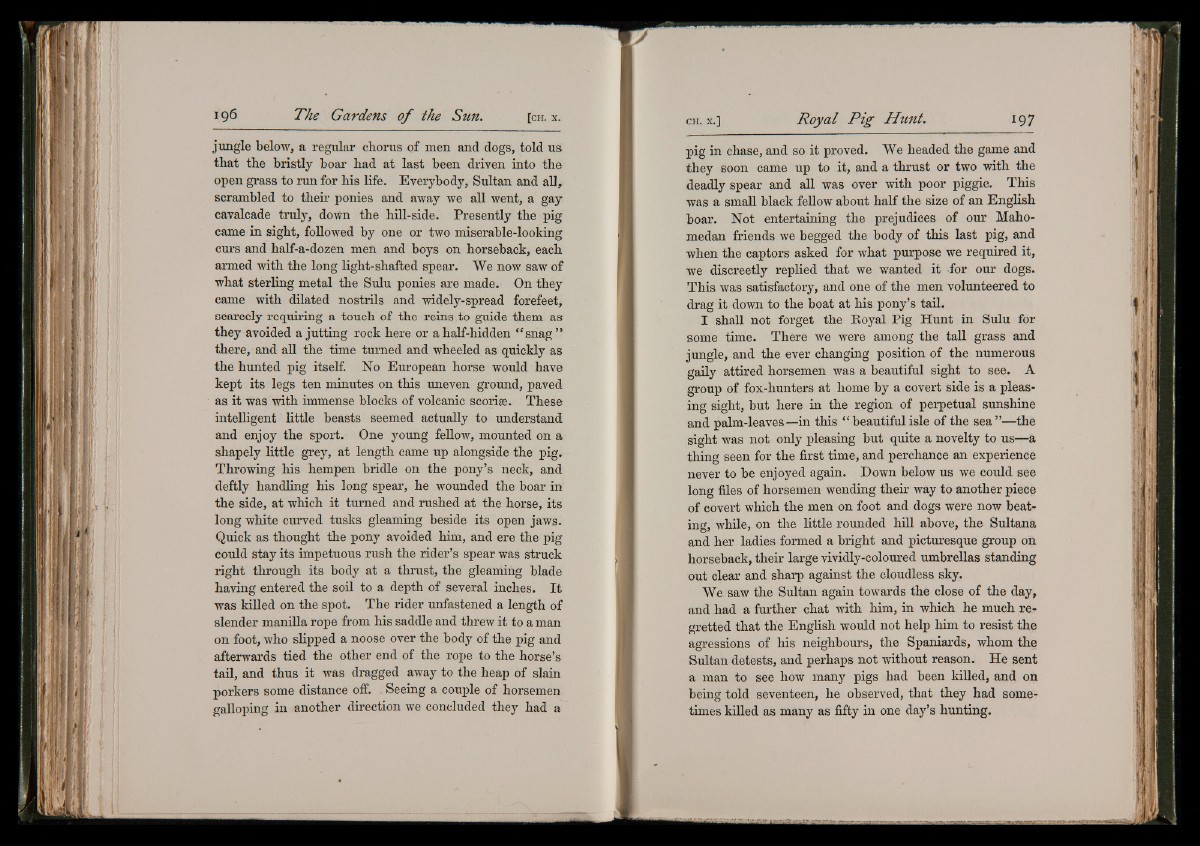
jungle below, a regular chorus of men and dogs, told us
that the bristly boar had at last been driven into the
open grass to run for his life. Everybody, Sultan and all,
scrambled to their ponies and away we all went, a gay
cavalcade truly, down the hill-side. Presently the pig
came in sight, followed by one or two miserable-looking
curs and half-a-dozen men and boys on horseback, each
armed with the long light-shafted spear. We now saw of
what sterling metal the Sulu ponies are made. On they
came with dilated nostrils and widely-spread forefeet,
scarcely requiring a touch of the reins to guide them as
they avoided a jutting rock here or ahalf-hidden “ snag”
there, and all the time turned and wheeled as quickly as
the hunted pig itself. No European horse would have
kept its legs ten minutes on this uneven ground, paved
as it was with immense blocks of volcanic scoriae. These
intelligent little beasts seemed actually to understand
and enjoy the sport. One young fellow, mounted on a
shapely little grey, at length came up alongside the pig.
Throwing his hempen bridle on the pony’s neck, and
deftly handling his long spear, he wounded the boar in
the side, at which it turned and rushed at the horse, its
long white curved tusks gleaming beside its open jaws.
Quick as thought the pony avoided him, and ere the pig
could stay its impetuous rush the rider’s spear was struck
right through its body at a thrust, the gleaming blade
having entered the soil to a depth of several inches. It
was killed on the spot. The rider unfastened a length of
slender manilla rope from his saddle and threw it to a man
on foot, who slipped a noose over the body of the pig and
afterwards tied the other end of the rope to the horse’s
tail, and thus it was dragged away to the heap of slain
porkers some distance off. Seeing a couple of horsemen
galloping in another direction we concluded they had a
pig in chase, and so it proved. We headed the game and
they soon came up to it, and a thrust or two with the
deadly spear and all was over with poor piggie. This
was a small black fellow about half the size of an English
boar. Not entertaining the prejudices of our Maho-
medan friends we begged the body of this last pig, and
when the captors asked for what purpose we required it,
we discreetly replied that we wanted it for our dogs.
This was satisfactory, and one of the men volunteered to
drag it down to the boat at his pony’s tail.
I shall not forget the Eoyal Pig Hunt in Sulu for
some time. There we were among the tall grass and
jungle, and the ever changing position of the numerous
gaily attired horsemen was a beautiful sight to see. A
group of fox-hunters at home by a covert side is a pleasing
sight, but here in the region of perpetual sunshine
and palm-leaves—in this “ beautifulisle of the sea”—the
sight was not only pleasing but quite a novelty to us—a
thing seen for the first time, and perchance an experience
never to be enjoyed again. Down below us we could see
long files of horsemen wending their way to another piece
of covert which the men on foot and dogs were now beating,
while, on the little rounded hill above, the Sultana
and her ladies formed a bright and picturesque group on
horseback, their large vividly-coloured umbrellas standing
out clear and sharp against the cloudless sky.
We saw the Sultan again towards the close of the day,
and had a further chat with him, in which he much regretted
that the English would not help him to resist the
agressions of his neighbours, the Spaniards, whom the
Sultan detests, and perhaps not without reason. He sent
a man to see how many pigs had been killed, and on
being told seventeen, he observed, that they had sometimes
killed as many as fifty in one day’s hunting.